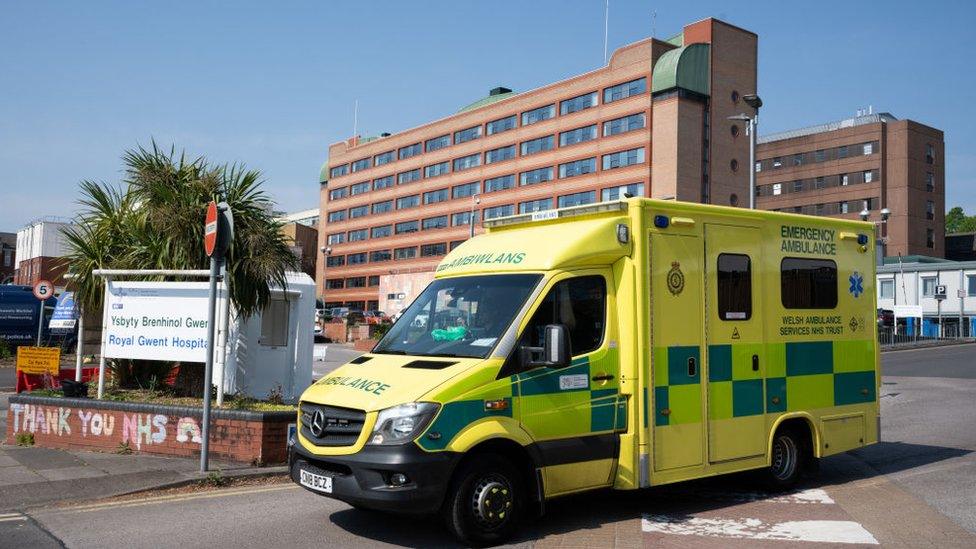Covid: Wales already breaching part of lockdown criteria
- Published
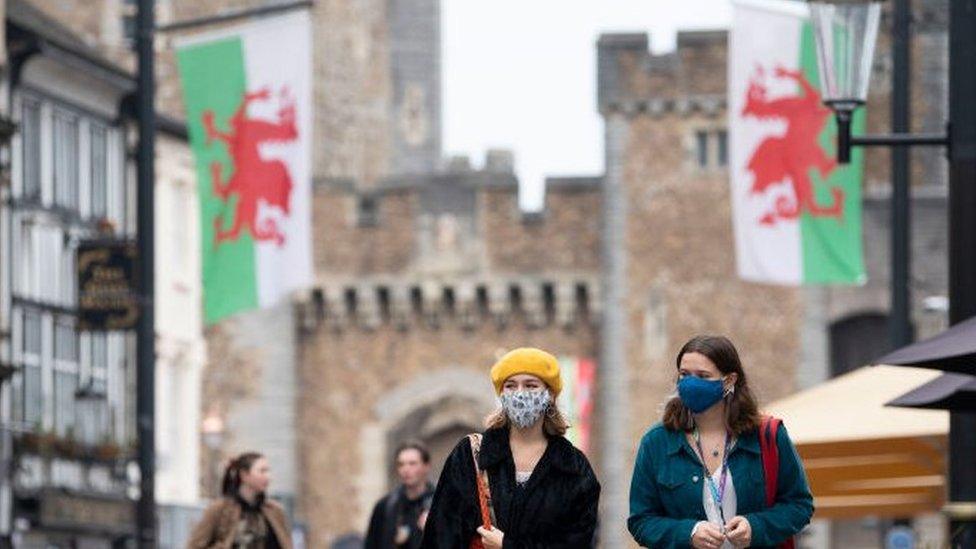
The Welsh Government is publishing a new four-tier alert system
Wales is already in breach of some of the key indicators used to determine future lockdowns.
The first minister said a lockdown could be introduced after Christmas if rates do not begin to fall.
But Wales' current case rates and rate of positive tests currently exceed indicators that would be considered.
The Welsh Government has said it is unlikely to introduce further restrictions before the five-day Christmas period.
The indicators are part of the Welsh Government's new four-level system of Covid-19 restrictions, laid out in a new 'Coronavirus Control Plan' published on Monday.
Wales is currently in level three and restrictions equivalent to a lockdown would be brought in if the alert level was raised to four.
Schools and places of worship will remain open and non-essential retail closed, although click-and-collect would be allowed.
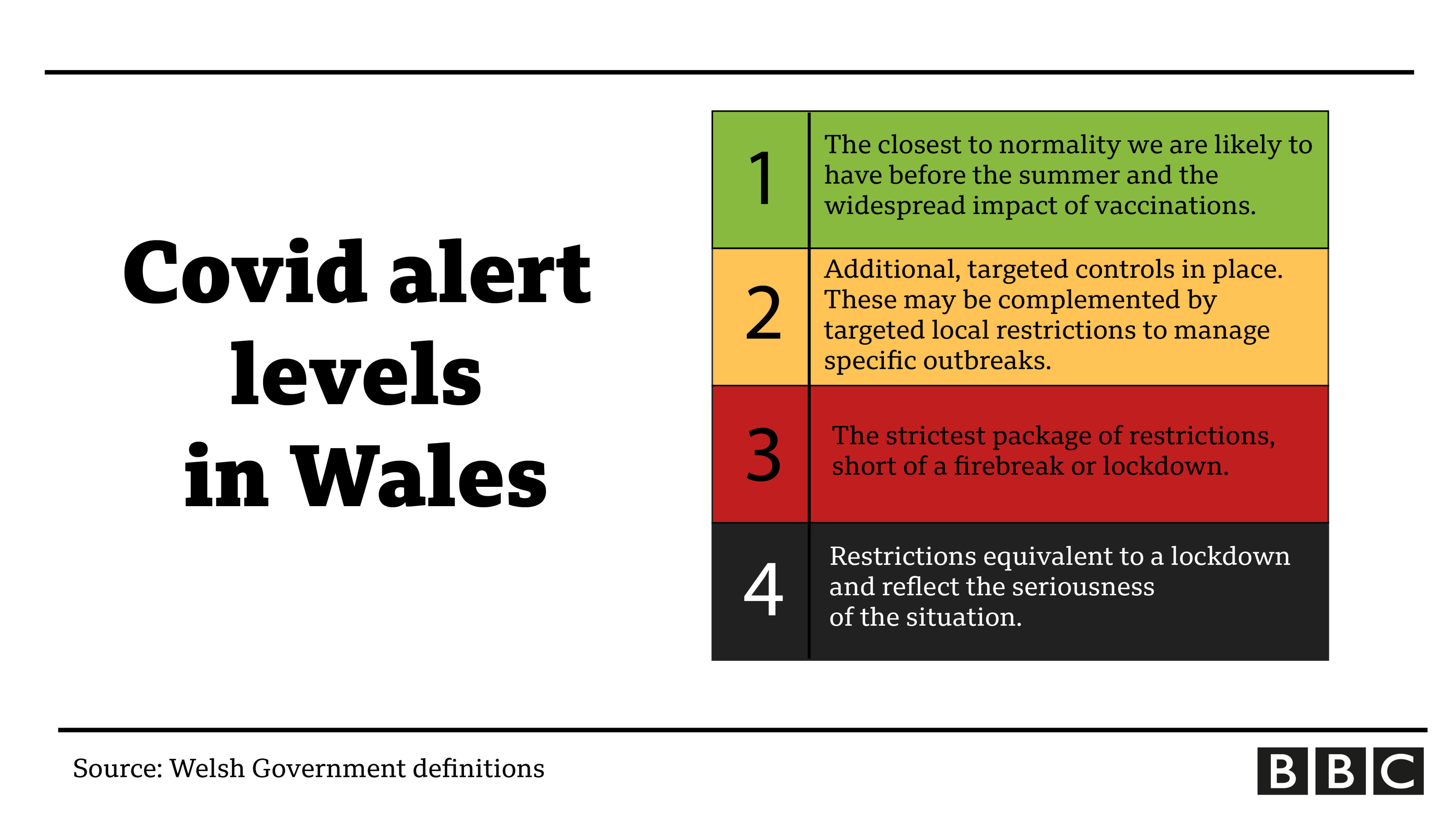
The plan said the vaccine programme offers a "glimmer of hope" but that safety measures and rules will have to be in place well into 2021.
Indicators to determine which level of restrictions are required "are not mechanical thresholds - they are broad principles, which will be used to inform balanced judgments".
Some of the key indicators to judge whether Wales needs to move to level four restrictions, include a confirmed seven-day case rate of more than 300 cases per 100,000 people and test positivity above 10% over seven days.
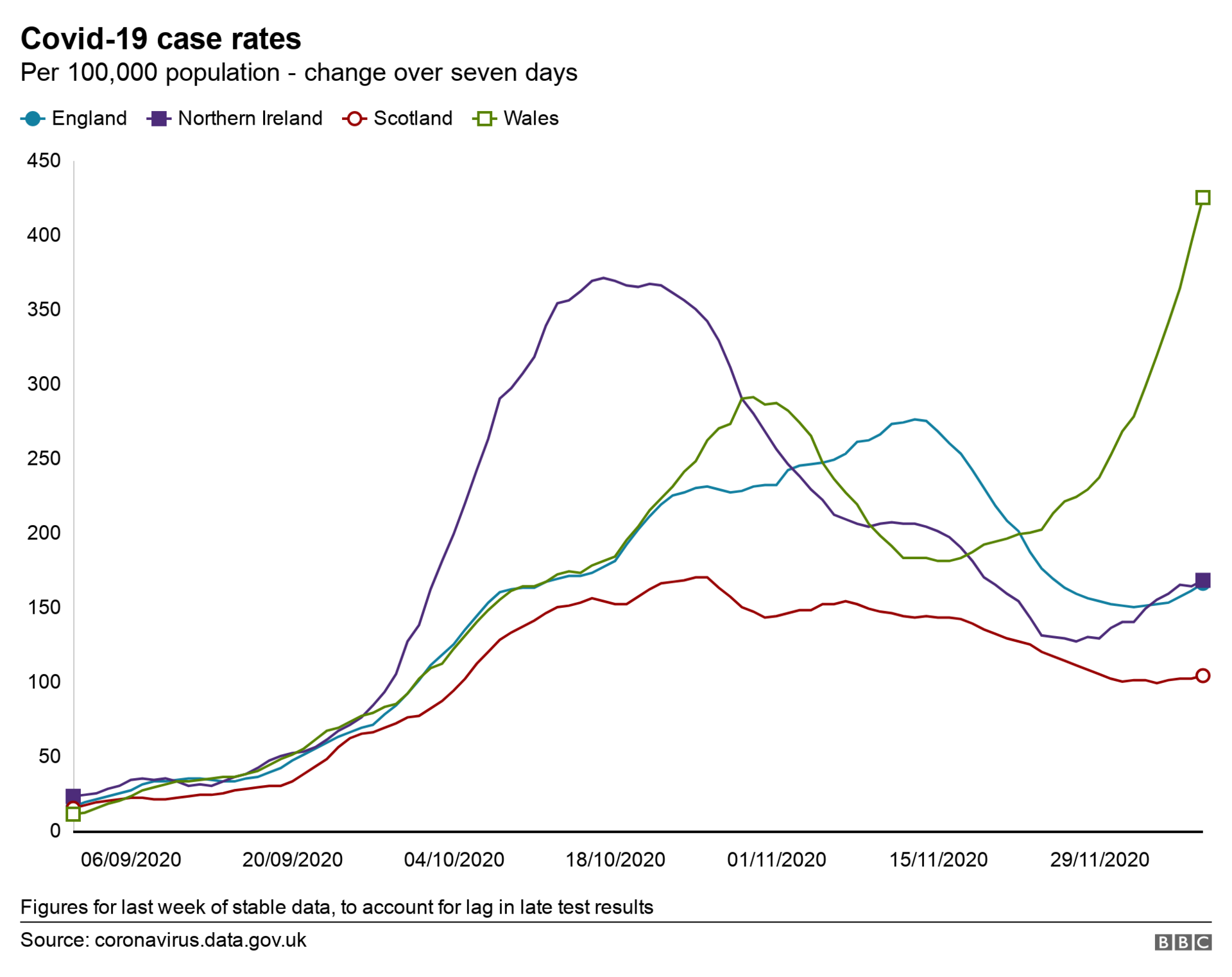
In the seven days until 9 December, Wales had a case rate of 450.4 and a test positivity rate of 19.5%, according to Public Health Wales' figures.
Concerns over hospital capacity is also a key indicators for alert level four.
Two of Wales' seven local health boards - Swansea Bay University and Aneurin Bevan Health Board - have suspended some non-urgent care in response to increased coronavirus cases.
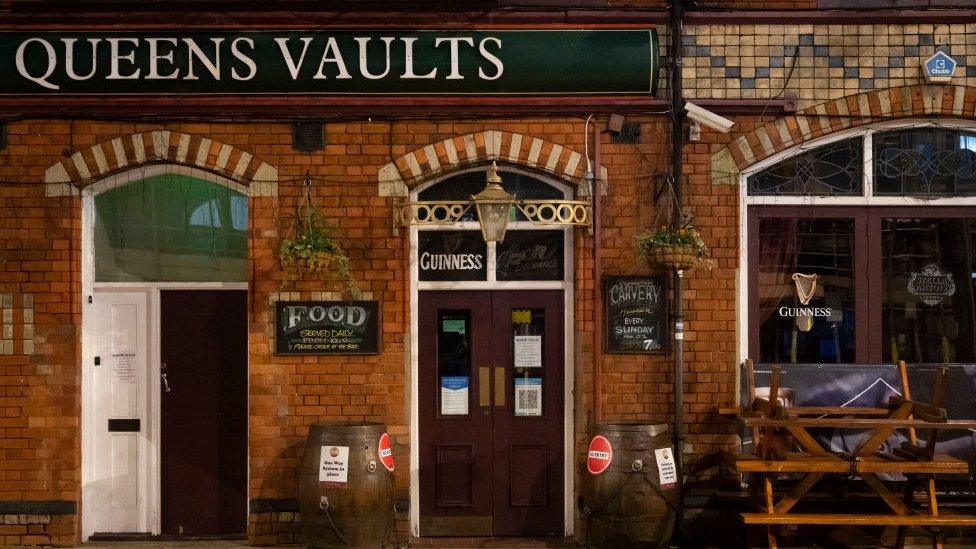
Pubs would be closed under level 4
The Welsh Intensive Care Society has said critical care would be unable to cope in the coming weeks without "intervention at the highest level".
But the Welsh Government has said it is unlikely to introduce any further restrictions before the five-day Christmas period, from 23 to 27 December, when up to three households will be able to stay together.
Its new paper outlines that the "severity" of level four restrictions "make it suitable for shorter periods to provide a short, sharp shock before the situation necessitates a longer period of time" in lockdown.
The plan adds that "intervening early is more effective and that time-limited interventions are likely to be more effective than open-ended restrictions with no end date."
Wales could move up more than one level, for example, from level one to level three, but would only move down one level at a time and would take a number of weeks.
The four levels of restrictions will initially be implemented across the whole of Wales but there could be regional or localised differences if the evidence points to sustained differences between areas.
'No detail'
The plan was criticised by Joseph Carter, Head of Asthma UK & British Lung Foundation Wales, who said it provided "no detail" about the support for people who are extremely clinically vulnerable.
Ashley Rogers, the commercial director of the North Wales Business Council, said the new alert levels were a step in the right direction but said criteria for a regional approach was vague.
The Welsh Government paper outlines the kind of restrictions that could be implemented in each level.
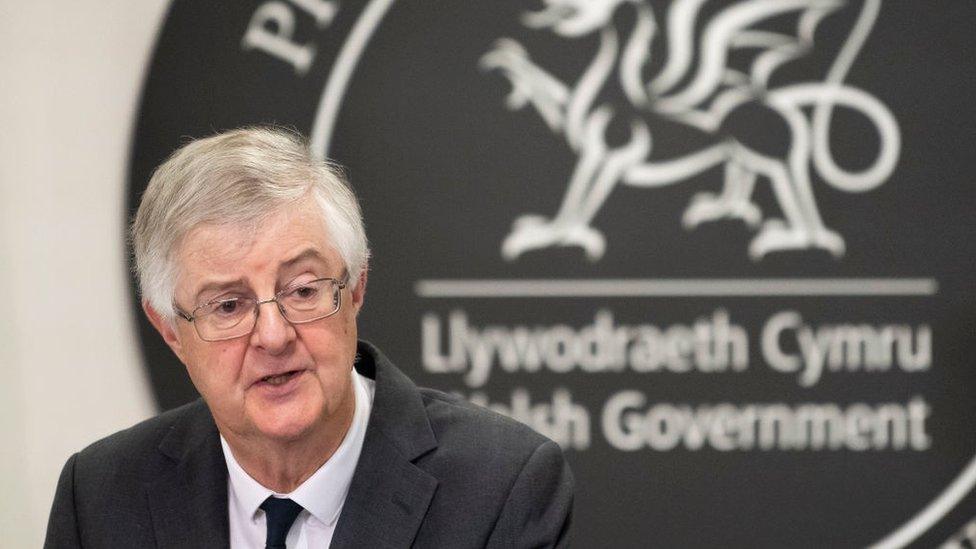
Mark Drakeford has warned of a possible lockdown after Christmas
What could you do in Level 1?
Up to six adults could meet in a private house or garden, or in a café or restaurant. The restrictions don't apply to those under 11.
No more than 30 people could meet outdoors in a public space. but if the alert level to four Up to 50 people could attend organised indoor events and 100 people to an outdoor event, while stadia could also open for sporting events.
There is still a 10pm curfew on hospitality but there is no restriction on when food can be served.
All indoor and outdoor entertainment and leisure venues can open too, with the exception of nightclubs.
Weddings, civil partnerships and funerals can take place with restrictions on numbers, depending on the venue, but the indoor and outdoor limit on numbers.
What could you do in Level 2?
Only four from up to four different households can meet in pub, cafe or restaurant, or in a private garden. Only extended households can meet indoors. In outdoor public places the rule of four stands except for when an extended household meets up.
Hospitality businesses can open until 10pm and serve alcohol with a substantial meal.
Cinemas and indoor visitor attractions such as museums can open and venues can open to begin piloting events.
Travel to areas of high prevalence would not be allowed but there are no restrictions on international travel beyond having to quarantine upon return from certain destinations.
Ice-skating rinks would remain closed.
What could you do in Level 3?
Restrictions would be similar to what we have now.
You can only mix in private houses with your extended household or support bubble. You can, however, meet with four people from different households in a café or restaurant.
Hospitality businesses cannot serve alcohol and must close at 6pm but non-essential shops, hairdressers, beauty salons, gyms and holiday accommodation remain open.
Travelling is not allowed to areas of high prevalence and international travel is not advised.
Up to 30 people can meet for organised exercise outside, like a fitness class, but only 15 can do so inside. The restrictions do not apply to restrictions for children.
Wedding ceremonies and funerals can take place with limited numbers set by the venue but at this level, receptions can also take place with 15 people indoors and 30 outdoors.
What could you do in Level 4?
The public would be required to stay at home and only mix with their household or support bubble.
Travelling would only by allowed for essential purposes, such as for work and for caring responsibilities. International travel would not be allowed.
All indoor and outdoor events and visitor attractions would be cancelled or closed. Non-essential shops would close as would gyms, hairdressers, hospitality businesses and holiday accommodation.
Wedding ceremonies and funerals can take place with limited numbers, but no receptions or wakes can occur.
Schools however would remain open.
- Published13 December 2020
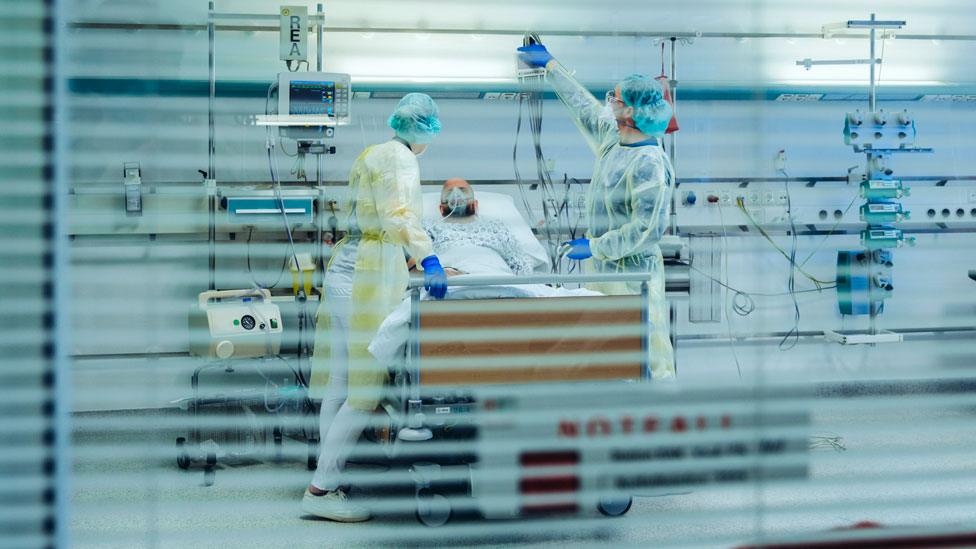
- Published13 December 2020
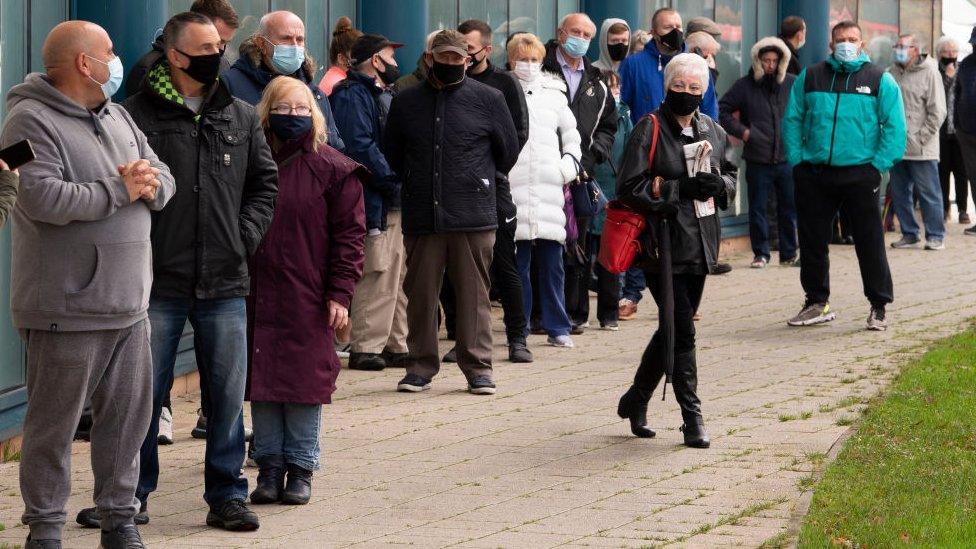
- Published11 December 2020
